Fall has arrived!
I’m looking out my dorm room window as I write this. The view over the college green is a stunning representation of 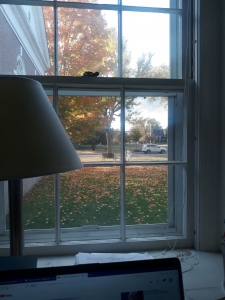 a New England Autumn, with oranges and reds mixing with green in the trees and on the grass. I think back to last year at this time, as I was just entering my second month in Vermont. Everyone warned me that we probably wouldn’t get much of a show, leaf wise, since the weather had been so “mild” for the season. When I say mild, I mean that it was 71 degrees with about a million percent humidity—or maybe it just felt like a million percent to a Californian used to dry weather. No. Even the students from the South were affectionately calling the Glover dorms “sauna.” We joked about having a luau, wearing Hawaiian shirts, and drinking cocktails decked with bits of pineapple.
a New England Autumn, with oranges and reds mixing with green in the trees and on the grass. I think back to last year at this time, as I was just entering my second month in Vermont. Everyone warned me that we probably wouldn’t get much of a show, leaf wise, since the weather had been so “mild” for the season. When I say mild, I mean that it was 71 degrees with about a million percent humidity—or maybe it just felt like a million percent to a Californian used to dry weather. No. Even the students from the South were affectionately calling the Glover dorms “sauna.” We joked about having a luau, wearing Hawaiian shirts, and drinking cocktails decked with bits of pineapple.
The locals were right, we didn’t get much of a show. The leaves were still green at that time, and fell almost before they turned. Not so this year. Several September nights in a row of freezing temperatures have started the changing colors. It’s been worth the wait, because the show is magnificent. And it’s just beginning.
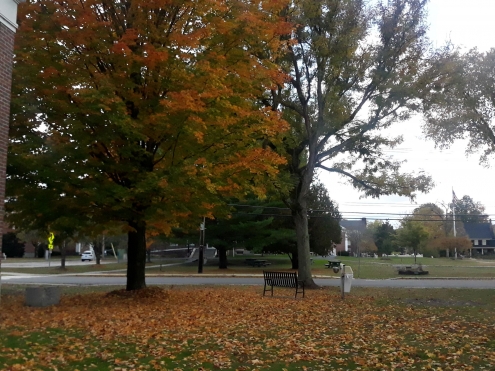
A New School Year
We’re a month into the new school year, with the first module finished and the second nearly there. The full semester classes are chugging along. First-year students are attending remotely due to Covid-19. We second-years find this sad. We were looking forward to meeting new writers and filling the dorms with new friends. I’m sure the first-years are sad about this as well, but we are moving along through our studies and doing the best we can despite having a pandemic to deal with. Forms class and working on Hunger Mountain, VCFA’s literary magazine, has the first-years occupied and the second-years are in the pleasant depths of Thesis Seminar and Critical Essay, doing the prep work for our all-important final semester, when we write our thesis—otherwise known as finishing our books!
Fall’s First Faculty Reading
We’ve had the first reading of our series, held on Zoom instead of at Cafe Anna. (God, how we miss Cafe Anna!) It featured our program director Rita Banerjee and faculty members Erin Stalcup and David Shields. View it here. I encourage you to watch the whole thing. The readings are worth it! But here are highlights:
Rita Banerjee
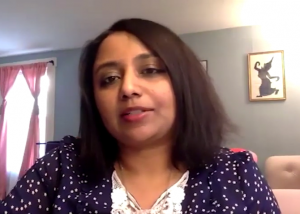 Rita read to us from her memoir about how women keep their cool against social, sexual, and economic pressure. In a chapter titled “Cool As Kin,” Rita tells us about her family members who inspired her to be a writer and a creative. “From my great uncle I first learned about curiosity and what it meant to see the world through the eyes of an artist. His paintings were inspired by the idea of nature in meditation.”
Rita read to us from her memoir about how women keep their cool against social, sexual, and economic pressure. In a chapter titled “Cool As Kin,” Rita tells us about her family members who inspired her to be a writer and a creative. “From my great uncle I first learned about curiosity and what it meant to see the world through the eyes of an artist. His paintings were inspired by the idea of nature in meditation.”
She shared with us a book detailing her uncle Satyen Ghosal’s art work before launching in to the reading of her own work. 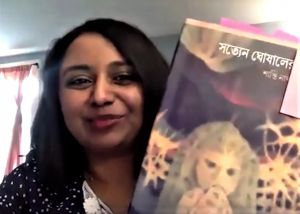
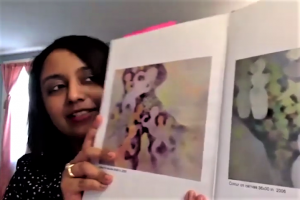 Rita’s writing is as lush and beautiful as her uncle’s painting, with prose that reads like poetry, sounding at times like a waterfall skipping over stones. You can’t help but follow her story as it flows along. There is an especially evocative section as she describes a shadowbox tableau in her uncle’s house that shows a depiction of village life in ancient China. You can hear it from 00:12:17 to 00:14:10 on the video.
Rita’s writing is as lush and beautiful as her uncle’s painting, with prose that reads like poetry, sounding at times like a waterfall skipping over stones. You can’t help but follow her story as it flows along. There is an especially evocative section as she describes a shadowbox tableau in her uncle’s house that shows a depiction of village life in ancient China. You can hear it from 00:12:17 to 00:14:10 on the video.
Rita also read a section from her essay “Mano a Mano” about growing up in Jersey and facing racism, tribalism, and prejudice. I highly recommend you listen.
Erin Stalcup
Erin is the editor of Hunger Mountain literary magazine. She’s also co-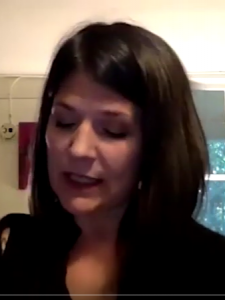 founder of the magazine Waxwing, and, of course, teaches here at VCFA. Erin told us that her tactic for picking what to read was to go with the piece that scared her the most to share, and she then read the first half of the first chapter of her novel in progress The Keener.
founder of the magazine Waxwing, and, of course, teaches here at VCFA. Erin told us that her tactic for picking what to read was to go with the piece that scared her the most to share, and she then read the first half of the first chapter of her novel in progress The Keener.
The chapter starts with Maeve McNamara at an awards shows, with paparazzi snapping picture after picture of her. She is the most famous keener in the world.
“What’s a keener?” you may ask.
A keener is someone who keens—or cries—for the dead. America has no sense of mourning, you see. We’ve become a society that’s so homogenized, so removed from our various homelands that we have no culture around mourning. So we borrow a culture of mourning from the Irish, who do it so well. As the narrator puts it “…we agreed upon a consensual reverse colonization. Ireland didn’t impose their cultural customs upon us, but they let us adopt them.”
The story so far is both thought provoking and funny, describing a world that hasn’t happened exactly how ours has happened…yet! Maeve has keened for various famous rockstars (Bowie, Prince), hip-hop artists (Lisa Left Eye Lopes), singer/actors (Whitney Houston) and underground icons (Holly Woodlawn)! But, Maeve has also keened for Brexit and, just to remind you that this book is a work of speculative fiction, she’s keened for the dissolution of the U.K.
There are more funny parts, like the send up of fangirling with the objects of adoration being far more pop-culture than usual. There is also a beautiful section that compares Maeve’s keening to a selkies’ cry, banshees wailing, and an “old man at the pub who doesn’t think the college girl believes he saw a faerie in his garden when he was a child.” My favorite, though, is that Maeve’s keening is like “the hiss of a striking snake that never was on the island for St. Patrick to remove.” (Um, Erin, we should talk! Have you SEEN my tattoo?)
I can’t wait for Erin’s book to be finished and published so I can devour it.
David Shields
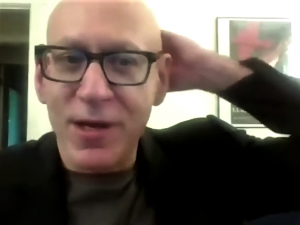 David read to us from his soon-to-be-published book The Very Last Interview, a compilation of some 2,700 questions that he’s been asked in interviews over the past 40 or so years. Not his answers, mind you, of which he said he has no interest, but the questions. He’s “fascinated by the aggressiveness” of these questions. He’s not kidding. These are some of the rudest, most pompous and arrogant questions to ever escape the mind, mouth, or pen of an interviewer. David views these as humorous. I can see the humor in them, BUT…if they were asked of me I’m sure I would’ve had to spend some time as a puddle-of-sad on the floor, or on a mountaintop flinging lightening bolts before I ever thought of laughing. Kudos to David for having a thicker skin!
David read to us from his soon-to-be-published book The Very Last Interview, a compilation of some 2,700 questions that he’s been asked in interviews over the past 40 or so years. Not his answers, mind you, of which he said he has no interest, but the questions. He’s “fascinated by the aggressiveness” of these questions. He’s not kidding. These are some of the rudest, most pompous and arrogant questions to ever escape the mind, mouth, or pen of an interviewer. David views these as humorous. I can see the humor in them, BUT…if they were asked of me I’m sure I would’ve had to spend some time as a puddle-of-sad on the floor, or on a mountaintop flinging lightening bolts before I ever thought of laughing. Kudos to David for having a thicker skin!
Here are some of the best (or maybe the worst):
- “You’re dating a librarian? Seriously? You’re not just saying that to make a broader point?”
- “I’m not sure I understand. What is it you like so much about Cheever’s journals, other than, of course, his swooning self-abjection?”
- “Are you in sync with Elif Batuman, who says that she prefers most of her writer friends’ emails to the books they write? Any sense of whether, following this widely disseminated remark—widely disseminated by you, I might add—she still has any friends at all?”
- “Do you have any friends? Real friends, not just colleagues or collaborators?”
- “What kind of books do you like, then? Can you name one?”
- “What stops any author from merely indulging his or her predilections?”
- “Is it possible you’re doing nothing more than documenting your private anguish and fobbing it off as art?”
- “Ulysses bores you? What else? Hamlet? The Brothers Karamazov?”
- “Are you bored when you read? Are you bored when you’re not reading? What is your underlying impasse? What’s buried beneath that seeming numbness? Anything?”
- “No final quasi blistering apercus from you, Mr.Shields?”
And, my favorite:
- “Could you please name 11 prominent contemporary writers you vehemently dislike?”
(Okay, that one IS funny…kinda!)
Other News
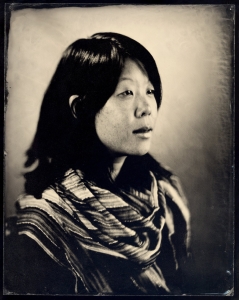 We welcome Shin Yu Pai as the new Assistant Director of the Writing & Publishing Program. She is the author of 10 books of poetry, and her essays have appeared in The Rumpus, City Arts, Yes! Magazine, Tricycle, and The Stranger, among others. Her work has been exhibited at the Dallas Museum of Art, The McKinney Avenue Contemporary, The Paterson Museum, American Jazz Museum, Three Arts Club of Chicago, The Center for Book Arts, International Print Center New York, and The Ferguson Center Art Gallery at the University of Alabama. Her artist books are held in the collections of University of Vermont, Bucknell University, University of Central Florida, The Jaffe Book Arts Collection, Trinity College, UCLA’s Louise M. Darling Biomedical Library, University of California at Irvine, Indiana University-Purdue University Indianapolis, University of Pittsburgh, Wesleyan University, Olin Library, University of Michigan, Special Collections, MIT Libraries, and the Savannah College of Art & Design. Shin Yu curates and produces the podcast Lyric World: Conversations with Contemporary Poets for Town Hall, a project with KUOW Public Radio.
We welcome Shin Yu Pai as the new Assistant Director of the Writing & Publishing Program. She is the author of 10 books of poetry, and her essays have appeared in The Rumpus, City Arts, Yes! Magazine, Tricycle, and The Stranger, among others. Her work has been exhibited at the Dallas Museum of Art, The McKinney Avenue Contemporary, The Paterson Museum, American Jazz Museum, Three Arts Club of Chicago, The Center for Book Arts, International Print Center New York, and The Ferguson Center Art Gallery at the University of Alabama. Her artist books are held in the collections of University of Vermont, Bucknell University, University of Central Florida, The Jaffe Book Arts Collection, Trinity College, UCLA’s Louise M. Darling Biomedical Library, University of California at Irvine, Indiana University-Purdue University Indianapolis, University of Pittsburgh, Wesleyan University, Olin Library, University of Michigan, Special Collections, MIT Libraries, and the Savannah College of Art & Design. Shin Yu curates and produces the podcast Lyric World: Conversations with Contemporary Poets for Town Hall, a project with KUOW Public Radio.
Welcome, Shin Yu!
Best Nike Sneakers | adidas Yeezy Boost 350
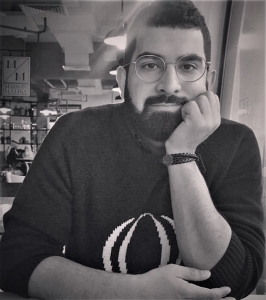 A self described nomad, Hassan AJ is an international student in his second year at VCFA. Five or six years ago he was a pre-med student secretly taking online writing classes. He was lured away from medicine when he fell in love with language itself, from the sentence level on. (In other words, from the micro–to the macro) He’s fascinated by the ability to “assemble language on the page to make the world less abstract and more tangible.”
A self described nomad, Hassan AJ is an international student in his second year at VCFA. Five or six years ago he was a pre-med student secretly taking online writing classes. He was lured away from medicine when he fell in love with language itself, from the sentence level on. (In other words, from the micro–to the macro) He’s fascinated by the ability to “assemble language on the page to make the world less abstract and more tangible.”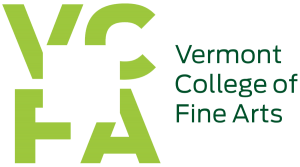
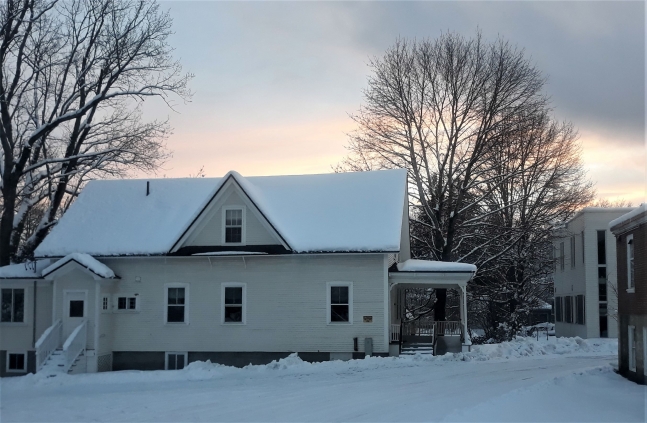
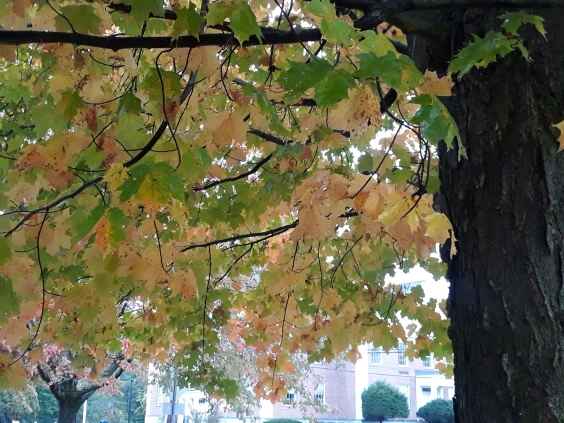
 a New England Autumn, with oranges and reds mixing with green in the trees and on the grass. I think back to last year at this time, as I was just entering my second month in Vermont. Everyone warned me that we probably wouldn’t get much of a show, leaf wise, since the weather had been so “mild” for the season. When I say mild, I mean that it was 71 degrees with about a million percent humidity—or maybe it just felt like a million percent to a Californian used to dry weather. No. Even the students from the South were affectionately calling the Glover dorms “sauna.” We joked about having a luau, wearing Hawaiian shirts, and drinking cocktails decked with bits of pineapple.
a New England Autumn, with oranges and reds mixing with green in the trees and on the grass. I think back to last year at this time, as I was just entering my second month in Vermont. Everyone warned me that we probably wouldn’t get much of a show, leaf wise, since the weather had been so “mild” for the season. When I say mild, I mean that it was 71 degrees with about a million percent humidity—or maybe it just felt like a million percent to a Californian used to dry weather. No. Even the students from the South were affectionately calling the Glover dorms “sauna.” We joked about having a luau, wearing Hawaiian shirts, and drinking cocktails decked with bits of pineapple.
 Rita read to us from her memoir about how women keep their cool against social, sexual, and economic pressure. In a chapter titled “Cool As Kin,” Rita tells us about her family members who inspired her to be a writer and a creative. “From my great uncle I first learned about curiosity and what it meant to see the world through the eyes of an artist. His paintings were inspired by the idea of nature in meditation.”
Rita read to us from her memoir about how women keep their cool against social, sexual, and economic pressure. In a chapter titled “Cool As Kin,” Rita tells us about her family members who inspired her to be a writer and a creative. “From my great uncle I first learned about curiosity and what it meant to see the world through the eyes of an artist. His paintings were inspired by the idea of nature in meditation.”
 Rita’s writing is as lush and beautiful as her uncle’s painting, with prose that reads like poetry, sounding at times like a waterfall skipping over stones. You can’t help but follow her story as it flows along. There is an especially evocative section as she describes a shadowbox tableau in her uncle’s house that shows a depiction of village life in ancient China. You can hear it from 00:12:17 to 00:14:10 on the video.
Rita’s writing is as lush and beautiful as her uncle’s painting, with prose that reads like poetry, sounding at times like a waterfall skipping over stones. You can’t help but follow her story as it flows along. There is an especially evocative section as she describes a shadowbox tableau in her uncle’s house that shows a depiction of village life in ancient China. You can hear it from 00:12:17 to 00:14:10 on the video. founder of the magazine Waxwing, and, of course, teaches here at VCFA. Erin told us that her tactic for picking what to read was to go with the piece that scared her the most to share, and she then read the first half of the first chapter of her novel in progress The Keener.
founder of the magazine Waxwing, and, of course, teaches here at VCFA. Erin told us that her tactic for picking what to read was to go with the piece that scared her the most to share, and she then read the first half of the first chapter of her novel in progress The Keener. David read to us from his soon-to-be-published book The Very Last Interview, a compilation of some 2,700 questions that he’s been asked in interviews over the past 40 or so years. Not his answers, mind you, of which he said he has no interest, but the questions. He’s “fascinated by the aggressiveness” of these questions. He’s not kidding. These are some of the rudest, most pompous and arrogant questions to ever escape the mind, mouth, or pen of an interviewer. David views these as humorous. I can see the humor in them, BUT…if they were asked of me I’m sure I would’ve had to spend some time as a puddle-of-sad on the floor, or on a mountaintop flinging lightening bolts before I ever thought of laughing. Kudos to David for having a thicker skin!
David read to us from his soon-to-be-published book The Very Last Interview, a compilation of some 2,700 questions that he’s been asked in interviews over the past 40 or so years. Not his answers, mind you, of which he said he has no interest, but the questions. He’s “fascinated by the aggressiveness” of these questions. He’s not kidding. These are some of the rudest, most pompous and arrogant questions to ever escape the mind, mouth, or pen of an interviewer. David views these as humorous. I can see the humor in them, BUT…if they were asked of me I’m sure I would’ve had to spend some time as a puddle-of-sad on the floor, or on a mountaintop flinging lightening bolts before I ever thought of laughing. Kudos to David for having a thicker skin! We welcome
We welcome